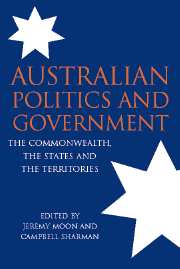Book contents
- Frontmatter
- Contents
- List of contributors
- List of figures and tables
- Acknowledgements
- 1 Introduction
- 2 The Commonwealth
- 3 New South Wales
- 4 Queensland
- 5 South Australia
- 6 Tasmania
- 7 Victoria
- 8 Western Australia
- 9 Australian Capital Territory
- 10 Northern Territory
- 11 One System or Nine?
- Note on Sources and Links to the Web
- Notes
- Appendix: Periods in Office
- References
- Index
7 - Victoria
Published online by Cambridge University Press: 05 September 2012
- Frontmatter
- Contents
- List of contributors
- List of figures and tables
- Acknowledgements
- 1 Introduction
- 2 The Commonwealth
- 3 New South Wales
- 4 Queensland
- 5 South Australia
- 6 Tasmania
- 7 Victoria
- 8 Western Australia
- 9 Australian Capital Territory
- 10 Northern Territory
- 11 One System or Nine?
- Note on Sources and Links to the Web
- Notes
- Appendix: Periods in Office
- References
- Index
Summary
Since the discovery of gold in 1851, Victoria has vied with New South Wales for the position of the most affluent and powerful of the Australian states. For a brief time in the 1880s the population of the Victorian capital, Melbourne, was greater than that of its northern rival, Sydney. This moment of dominance was to be fleeting. For much of Australia's white settler history, from the gold rushes through to the beginning of the twenty-first century, Victoria has been the second state and Melbourne the second city; second, that is, to New South Wales and its capital Sydney in terms of population, economic output, and the intangible notion of power and influence within the Australian federation.
This is not to underestimate the critical importance that Victoria has had on national politics. Victoria played a pivotal role in the moves which led to federation in 1901 and provided many influential delegates to the various constitutional conventions who drafted the Australian federal constitution in the 1890s (de Garis 1974). One of these, Alfred Deakin, played a key role in formulating the Commonwealth Constitution and helped to have it passed by the British parliament. Deakin was to be one of the early Australian prime ministers, and his liberal ideas were to be influential on non-Labor politics (La Nauze 1979). Deakin was one of eleven Victorians who have served as prime minister since federation. Victoria has also provided eleven leaders of the federal opposition.
- Type
- Chapter
- Information
- Australian Politics and GovernmentThe Commonwealth, the States and the Territories, pp. 154 - 182Publisher: Cambridge University PressPrint publication year: 2003



